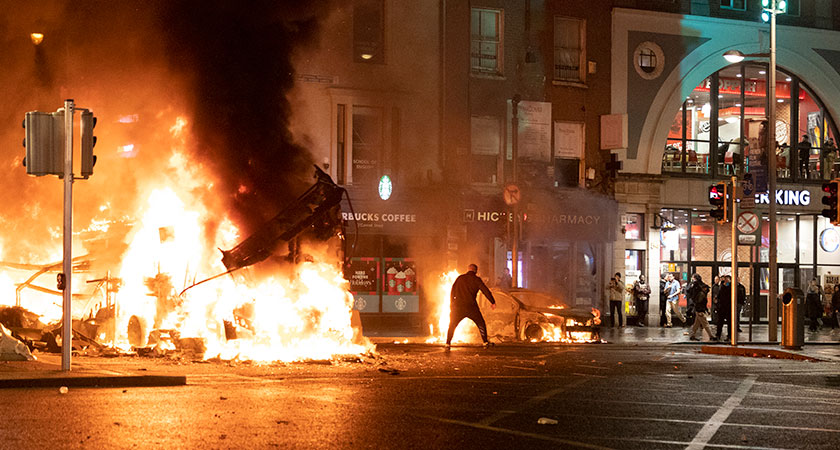SINN FÉIN has hit out at a claim that far-right activists used the Irish language to avoid detection on social media while spreading hate content during the Dublin riot.
An official from the European Commission made the suggestion to RTÉ after Ireland became the first country to trigger an alert under the EU's new online speech laws.
Aengus Ó Snodaigh TD, Sinn Féin's spokesperson on Gaeilge, Gaeltacht, Arts and Culture, said it was 'frankly preposterous' to think the rioting was linked to a lack of Irish-speaking moderators.
He added that far from being nationalists, those behind the disturbances had no interest in the Irish language.
A spokesperson for the EU Commission has now said that while a lack of fluent moderators has the potential to be exploited, there is 'no evidence' that it happened on this occasion.
'Smear'
Following the riot in Dublin on November 23, Irish authorities triggered an alert as part of the EU's Digital Services Act.
The legislation aims to compel social media companies to take more responsibility for tackling illegal contact on their platforms.
An alert from a member state sees the EU Commission contact social media firms to remind them of their obligations under the legislation.
Following the alert, a Commission official suggested far-right activists used the Irish language to avoid detection due to a shortage of fluent moderators.
"In the case of the riots in Dublin we saw that those spreading hatred, illegal and harmful content 'exploited’ the lack of Gaelic speaking moderators," the official told RTÉ.
Following the comments, Mr Ó Snodaigh challenged the Commission to back up their claims.
"It is frankly preposterous to anyone who speaks Irish to think that the hateful riots that took place in Dublin were a result of Irish language content not being monitored," he said,
"It is widely known that none of the leading far-right agitators who claim to be 'nationalists' demonstrate even a passing interest, let alone competence, in our national language.
"I call on the European Commission to produce the evidence for their claims before they choose to smear an already vulnerable minority language community."
He added that Sinn Féin had previously lobbied for more Irish-speaking moderators — not because the dearth of numbers may be exploited but because Gaeilgeoirs using social media platforms responsibly were being hindered.
"One platform banned advertisements in Irish because, without a competent moderator, they couldn't be sure it was appropriate and wasn't hateful," he said.
"Large corporations censoring content simply because it is in Irish should not be tolerated in a bilingual state, especially one in which the same companies benefit from our generous tax regime."
'Vulnerability'
Johanes Bharke, the EU Commission's Coordinating Spokesperson for the Digital Economy, Research and Innovation, has now said there is no evidence that people were posting messages in Irish to avoid posts being taken down during the disorder.
However, highlighting the 'striking' disparity in numbers of Irish-speaking moderators employed by social media companies, he said it was important that firms were 'better prepared and sufficiently staffed' for such a scenario.
"There is no evidence as such that this actually happened but this is something that is currently being looked into," he told Aine Lawlor on RTÉ Radio 1's Morning Ireland programme on Friday.
"But the point is more that there is a vulnerability that you of course create as a platform if you have only one person who actually speaks that language.
"It's not only language knowledge, it's also a question of knowing the cultural context in order to be effective as a content moderator."


